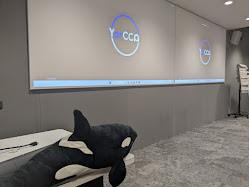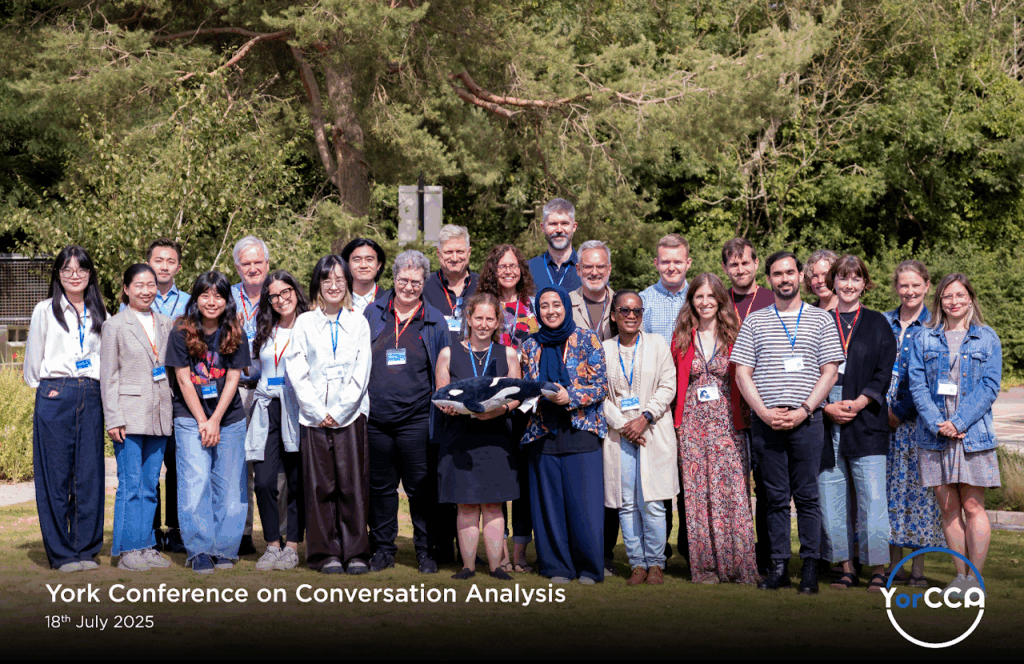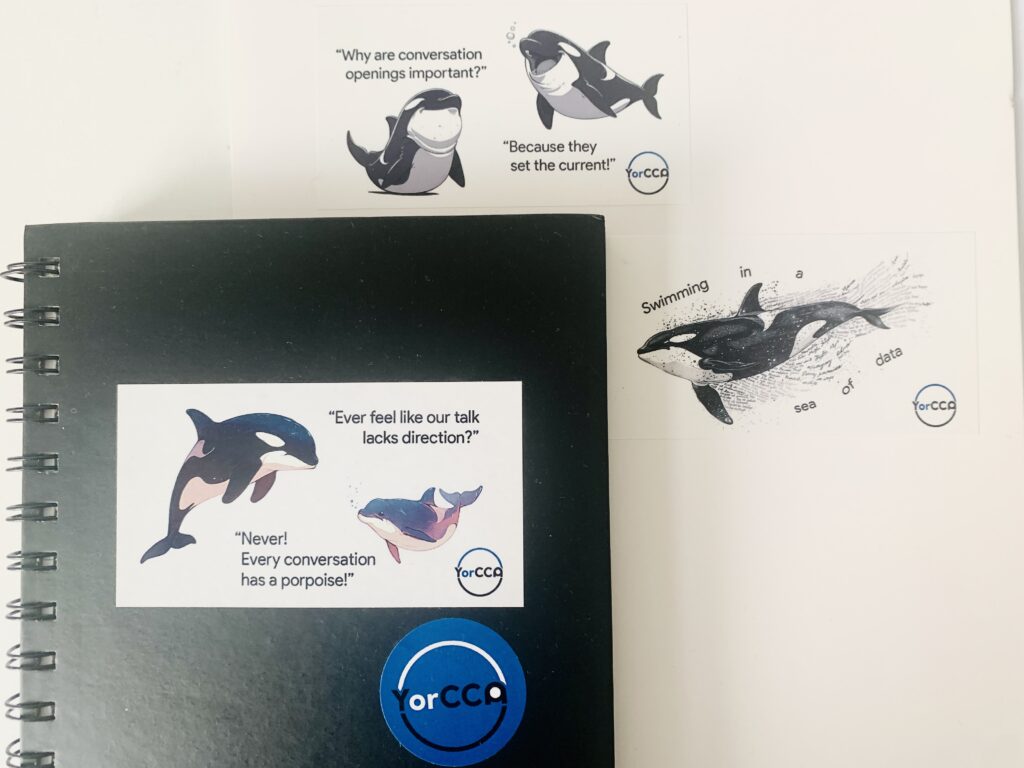Sanaa Hyder
The York Conference on Conversation Analysis (YorCCA) 2025 was held on Friday, the 18th of July. Attendees convened in-person at the University of York, and joined virtually via Zoom. Those present in-person had the additional option to attend a workshop with Professors Paul Drew (University of York) and Lorenza Mondada (University of Basel) the next day on the 19th of July. The aim of YorCCA, as outlined on the conference website, is ‘to provide a welcoming environment for PhD researchers to present their work to fellow PhD researchers and established academics and to receive feedback and advice as they develop their projects.’ This was my second time attending YorCCA and I can confirm that on both occasions I found it welcoming and enjoyable.

On the first day, presentations took place across two blocks in the morning and afternoon, with lunch and coffee breaks in between. Although presentations on the topic of ‘healthcare interactions’ dominated the conference agenda, they did not overshadow the impressive work that came from classroom interactions, craft workshops and natural encounters. The incredible Paul Drew started the conference off with a talk on ‘Some applications of conversation analysis to medical interactions.’ Paul shared casual anecdotes about pioneering conversation analysts such as Gail Jefferson, while offering conversation analytic insights on misalignments/alignments, overlaps and enquiries in medical interactions. His conclusion centred on the usefulness of conversation analysis and knowledge broadly, and the implications of applied conversation analysis for training, practice and policy.
Ruiyang Ma (University of York) joined us online to speak about her interesting work on ‘Diagnosis as a process in Chinese primary care consultations,’ reconceptualizing diagnosis as a collaboratively achieved process. We heard from Gilian Noord (University of Nottingham) on ‘Negotiating medication continuity’ in remote medication reviews conducted within the NHS primary care, raising important questions related to patient centred care and long-term medication use. Next, I (University of Manchester) shared my findings on ‘culturally informed’ communication from my work-in-progress titled, ‘How does ‘culture’ become relevant in consultations between general practitioners and ethnic minority patients?.’ Catherine Turner (Ulster University) then presented her exciting work on, ‘Responding to negative evaluative stance with ‘I know’ in an antenatal care setting,’ with a unique set of data drawn from interactions between midwives and ethnically minoritised women.
Hongze Yang (Newcastle University) delivered a presentation on ‘The use of absurd candidate formulations in second language classroom interaction,’ showing playful and light-hearted interactions from Chinese EFL young learners’ classroom. Following this, Jean-Marie Nau (University of Luxembourg) shared his thought-provoking research on ‘detachment from personal views’ and ‘what up- and downgrades tell us about how participants convey their preferences’ during a Baháʼí consultation (which Nau described as ‘a decision-making model emphasizing unity, collective inquiry, and detachment from personal views’; see programme abstracts here). Rosario Neyra (University of York) then gave us a riveting glimpse into ‘the recruitment of assistance in craft workshops’ using mixed-methods research. Alessia Davolio (University of Modena and Reggio Emilia) was the last in line of PGR presentations and spoke about her work on some epistemic and amusing uses of the interjection “eh” in Italian, drawing upon audio-recorded ordinary telephone calls. Lastly, Professor Lorenza Mondada delivered an extraordinary talk on ‘Multimodal conversation analysis: from talk to interacting bodies in their ecology.’ Truly a comprehensive presentation that was wide-ranging in scope, including discussion on body movements, body mobility, temporality and sequence organisation. I particularly enjoyed learning about ‘multisensoriality’ and the hierarchy of senses with respect to understanding interactions involving people who may be visually impaired.
Other notable aspects of the conference were the question-and-answer segments following each presentation, which were just as interesting as the talks delivered. For example, following Jean-Marie’s presentation involving Baháʼí consultations, Paul and Lorenza shared their observations on how conversation analysis could be used to demonstrate evidence for faith and ‘the super-addressee’ in talk. At this point, we appropriately teased Paul with the title ‘Bishop Paul’ as he had given a sermon that morning, calling the congregation to join the boat of conversation analysis. Lorenza and Paul then got into a brief epistemological/ontological debate (positivism vs social constructivism). Later, the conference committee hosted a dinner at Red Chilli in York, ending the first day of YorCCA. Two poster presentations were also available for viewing online throughout the conference (and are still currently accessible on the YorCCA website): Hongmei Zhu (Chongqing Technology and Business University) presented a poster on ‘Teachers’ Correction through Replacement in the Third Turn’; and Yaomin Zhang (Ocean University of China) presented on ‘Discrepancies in Assessment of Patients’ Health Concerns’ in consultations between Traditional Chinese Medicine doctors and patients.

The conference took place on the beautiful University of York campus, at the Church Lane building on the first day, and at the Department of Language and Linguistics on the second day for workshops. Professor Paul Drew led a workshop on applications of conversation analysis to medical interactions, while Professor Lorenza Mondada’s workshop involved multimodal conversation analysis. During all the conference and workshops breaks (for coffee and lunch), the attendees huddled close discussing their conversation analytic research while University graduates strolled outside in gowns, celebrating the success of their academic journeys. This report would be incomplete without also acknowledging the YorCCA merch, which deserves a special mention — the whimsical collection of stickers and stuffed Orca certainly brought us joy (see pictures). Finally, thank you to the wonderful conference team based at the University of York ‒ Rosario Neyra, Constance Kang Sun, Malebogo Moji, and Luyang Zhou ‒ led by Levi Farrington as the chair, and Kobin Kendrick as the advisor. YorCCA 2025 was a memorable summer event, and I highly recommend interested PGRs mark their calendars for the next one. You can follow them on @YorCCA_UoY on Twitter/X to find out when registrations open again.

